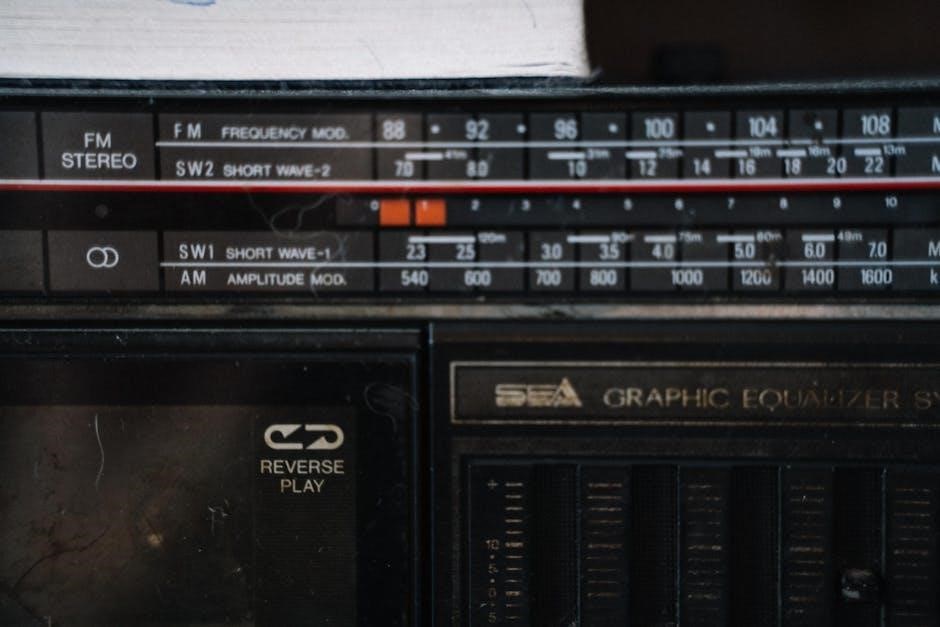The ham radio licence manual provides essential information and guidance for individuals seeking to obtain a ham radio licence, including study materials and exam preparation, using online resources and study guides.
Overview of Ham Radio Licensing
Ham radio licensing is a process that allows individuals to operate amateur radio equipment and communicate with other licensed operators. The licensing process typically involves studying for and passing an exam, which tests the individual’s knowledge of radio theory, operating practices, and regulations. There are different levels of licenses, each with its own set of requirements and privileges. The licensing process is designed to ensure that operators have a basic understanding of radio theory and operating practices, and are able to use their equipment safely and responsibly. The Federal Communications Commission (FCC) is responsible for issuing ham radio licenses in the United States, and similar regulatory bodies exist in other countries. Overall, ham radio licensing provides a framework for individuals to engage in amateur radio activities, while also ensuring that the radio spectrum is used safely and efficiently. Ham radio licensing is an important part of the amateur radio community.

Study Materials for Ham Radio Licence
Online resources and study guides provide essential study materials for ham radio licence, including manuals and practice tests, to help individuals prepare for the exams and obtain their licence easily always.
Ham Radio Study Guides and Practice Tests
Ham radio study guides and practice tests are available online to help individuals prepare for their ham radio licence exams. These study materials include question pools, flashcards, and practice tests that cover various topics such as regulations, frequency usage, and station operation. The study guides are designed to be comprehensive and easy to understand, making it easier for individuals to study and prepare for their exams. Many online resources also offer practice tests that simulate the actual exam experience, allowing individuals to assess their knowledge and identify areas where they need to focus their studies. Additionally, some study guides come with explanations and answers to help individuals understand the correct answers and learn from their mistakes. Overall, ham radio study guides and practice tests are essential tools for anyone looking to obtain their ham radio licence and become a licensed ham radio operator. They provide a convenient and effective way to study and prepare for the exams.

Preparation for Ham Radio Licence Exams
Preparation involves understanding exam formats and question pools using online resources and study guides effectively daily.
Understanding the Exam Format and Question Pools
The exam format and question pools are crucial components of the ham radio licence manual, providing individuals with a comprehensive understanding of what to expect during the examination process.
The question pools are regularly updated to reflect changes in technology and regulations, ensuring that licence holders are equipped with the most current knowledge and skills.
By familiarizing themselves with the exam format and question pools, individuals can better prepare for the exam and increase their chances of success.
The question pools cover a range of topics, including radio theory, operating practices, and safety procedures, and are designed to assess an individual’s knowledge and competence in these areas.
Overall, understanding the exam format and question pools is essential for anyone seeking to obtain a ham radio licence, and is a key part of the preparation process.
The exam format is multiple choice and the question pools are available online for study and review.

Types of Ham Radio Licences
There are three main types of ham radio licences, including Technician, General, and Extra Class licences, each with varying levels of privileges and requirements, using online study guides.
Technician, General, and Extra Class Licences
The Technician, General, and Extra Class licences are the three main categories of ham radio licences, each with its own set of privileges and requirements. The Technician Class licence is the entry-level licence, requiring a basic understanding of radio theory and operation. The General Class licence requires a more advanced understanding of radio theory and operation, as well as knowledge of FCC regulations and station operation. The Extra Class licence is the most advanced licence, requiring a thorough understanding of radio theory, operation, and regulation. Each licence class has its own set of exam questions and requirements, and individuals can progress from one class to the next by passing the required exams. Online study guides and resources are available to help individuals prepare for the exams and obtain their desired licence class. These resources include study manuals, practice tests, and online courses.

Administering Ham Radio Licence Exams
Volunteer examiners administer ham radio licence exams, ensuring compliance with FCC regulations and procedures, using secure protocols and methods.
Role of Volunteer Examiners in Ham Radio Licensing
Volunteer examiners play a crucial role in the ham radio licensing process, as they are responsible for administering the exams and ensuring that candidates meet the necessary requirements. These examiners are licensed radio amateurs who have undergone training to administer the tests. They are responsible for verifying the identity of candidates, distributing exam materials, and ensuring that the exam is conducted in a secure and fair manner. The volunteer examiners also grade the exams and provide feedback to the candidates. Their role is essential in maintaining the integrity of the ham radio licensing process and ensuring that only qualified individuals are granted a license. The use of volunteer examiners also helps to keep the cost of obtaining a ham radio license low, making it more accessible to a wider range of people. Overall, the role of volunteer examiners is vital to the ham radio licensing process.